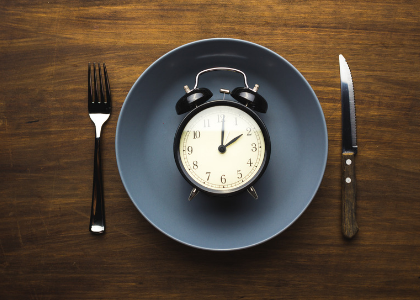
Could Reverse Fasting Help You Lose Weight?
By Claire Georgiou, Reboot Naturopath, B.HSc ND
We’ve all heard of intermittent fasting but what’s reverse fasting? Just in case you haven’t heard of intermittent fasting here’s the heads up!
Intermittent fasting (IF) is an eating pattern that cycles between periods of fasting and eating. Humans have evolved to function well when food is not available, which really is more natural then eating constantly day after day, month after month and year after year without a break. It includes either choosing to make sure you fast for 12 to 20 hours daily and even up to 24 hours for a few days per week.
Many people chose to fast for the recommended time of 16 hours, often referred to as the 7/11 plan, where you make sure you eat no later than 7 p.m. and you don’t eat until 11 a.m. the following day, so you only eat within an 8-hour window. Some people may choose to vary the time to suit their schedule but you catch my drift.
Intermittent fasting has shown some truly amazing health benefits which work to support:
- Weight loss
- Weight control
- Stabilized blood sugar levels
- Improved immunity
- Improved energy
- Increased life expectancy
- Decreased cancer risk
- Improved telomere health (DNA health)
- Improved memory
- Decreased rates of depression
- Lowering cholesterol
This fasting period allows for many metabolic changes to occur as your body adjusts to no food or nothing more than 50 calories in this time period, body fat starts to get burnt in this period supporting the production of fat burning hormones. The general rule of thumb is that if you stay under 50 calories, then you’ll remain in the fasted state.
So what is Reverse Fasting?
Reverse fasting is where instead of skipping breakfast you skip dinner or you enjoy an early evening meal before 5 p.m. and you have breakfast at 9 a.m., which to me, makes more sense. Since dinner is the main meal of the day for many people, skipping breakfast seems easier but for metabolic support and improved health, skipping dinner or having an early evening meal will give you an increase in results. This is referred to as early time-restricted eating.
In one study, researchers discovered that eating earlier in the evening made significant improvements for breast cancer survivors. There was a 36 percent reduction in breast cancer recurrence then those that ate freely. In the study, they had a 13-hour fasting window daily.
Researchers at the University of Surrey, found that people who moved dinner time 90 minutes earlier and breakfast 90 minutes back, on average, lost more than twice as much body fat as those in the control group over a 10-week period.
A number of animal studies have determined that restricted eating throughout adulthood leads to dramatic improvements in lifespan and general health. It has been theorized with supporting evidence that cutting back on food allows the body to perform cellular repair and maintenance more easily without needing extra energy to always be digesting food. This is something that has been supported with many fasting theories and juice fasting results which are often positively astounding.
Fasting or calorie restriction doesn’t have to be happening ALL the time, having periods of fasting or a regular eating time window (8-12 hours) is enough to gain the best results.
Other studies are also showing some surprising and very positive results. In a human study with insulin resistance and pre-diabetes they found that calorie-restricted eating for 5 days out of 30 days gave some amazing blood sugar and anti-inflammatory results in just three months. The fasting-like diet reduced body weight and body fat, lowered blood pressure, and decreased the hormone IGF-1, which has been implicated in aging and disease. In mice studies, the pancreas actually regrew back into a healthy size that produced insulin normally after several cycles of fasting in pre-diabetic mice.
It’s important during this period of fasting that you make sure you are drinking plenty of fluids such as filtered water and/or herbal tea.
Rebooting is another way to experience the benefits of calorie restriction and many of the fasting benefits. Time restricted eating, periods of Rebooting to reset your system and even a few very low calorie days (5) per month are all ways to experience the benefits of calorie restriction, intermittent fasting and reverse fasting.